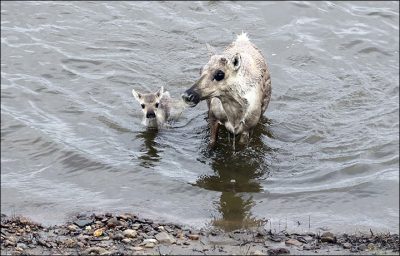Northern Reindeer that Roamed Taymyr Peninsula Are at the Brink of Extinction
Poaching, climate change and excessive hunting caused colossal population drop.

More than 40,000 wild reindeer perished since the last count in 2017, said scientists who returned from a major expedition to the Taymyr Peninsula.
The Yenisei group of reindeer has disappeared entirely while the westernmost group living along the Tareya River has dramatically shrunk in size from 44,300 animals in 2017 to only several thousands now.
A research conducted over a territory of 80,000km2 – equal to the area of the United Arab Emirates – concluded that drastic measures are needed to claw back wild reindeer populations in all of Taymyr, northern Evenkia and western Yakutia.





Poaching, climate change and excessive hunting caused colossal population drop. Pictures: Mikhail Bondar/WWF Russia, Zapovedniki Taymyra
The Taymyr Peninsula sits on the very tip of vast Krasnoyarsk region, facing the Severnaya Zemlya archipelago – and yes this is the fastest warming place on earth.
The air temperature in Taymyr has increased by 1.2C degrees over the past decade, which is above average not only for Russia but for the planet, said Andrey Kiselyov, a leading researcher.
Changing temperature deviates reindeer from their regular migration routes.
A very small number of reindeer walked in known migration corridors across Pyasina and Tareya rivers, this year’s research showed.




Researchers recommend to either ban hunting for a year or to shorten next hunting season by 1.5 months to give the reindeer time to breed. Pictures: Zapovedniki Taymyra, Mikhail Bondar/WWF Russia
‘Only seven years ago thousands of reindeer were passing through the Lake Ayan hollow. Back then I liked to pour a cup of tea, to come out and to sit on a tree stump and to watch them slowly wonder along a river. Reindeer were not scared of me, some walked several metres away from me’, said inspector and researcher Vasiliy Sarana from the Putorana nature reserve.
‘Now I drink tea in the house, and look through a cold window at an empty river bank. There are no reindeer passing through Ayan any more’, he added.
Sarana said that only 15 to 20 years ago the number of wild reindeer was 600,000 to one million.



Urgent measures are needed to claw the population back, experts say. Pictures: Mikhail Bondar/WWF Russia, Zapovedniki Taymyra
There were years of barbaric poaching and hunting which seemingly went unnoticed – or ignored – by local and regional authorities.
Male reindeer were attacked by antler hunters in spring, who axed or sawed them off right as defenceless animals crossed rivers.
Those of reindeers who survived the painful ordeal could not fight for females.
In autumns as reindeers migrated back to winter pastures they were met with group of hunters. In winters people chased them on snow mobiles.
‘If you add hunting quotas for indigenous people and reindeers’ deaths related to climate change to this madness, the losses are catastrophic!’, Vasiliy Sarana explained.
Researchers recommend to either ban hunting for a year or to shorten next hunting season by 1.5 months to give the reindeer time to breed.
Current number of calves is worryingly low at less than 7 per cent, while it has to be a quarter of the population.
The summer 2019 research expedition was supported by WWF Russia. A team of 13 researchers from Taymyr and Central Siberian Reserves in Krasnoyarsk region and Severtsov Institute of Ecology and Evolution in Moscow examined the traditional summer concentration spots from the air, studied reindeer migration routes and put GPS tracking collars on 2 female and 3 male reindeer from the Taymyr population.
*
Note to readers: please click the share buttons above or below. Forward this article to your email lists. Crosspost on your blog site, internet forums. etc.
Featured image is from Zapovedniki Taymyra

